My trip to Portland Oregon in March 2020 to the International Center for Academic Integrity Annual Conference may turn out to be my only physical visit to a conference in 2020. As always, there were a range of interesting talks presented, including (I hope) my own session on Discipline Differences in Contract Cheating.
It has taken me longer than usual to reflect on the conference as the whole positive experience was slightly shattered by hearing about the sudden passing of my long-time friend and research collaborator Robert Clarke. You can read more about the man we all knew as “Uncle Bob” in this tribute published in Times Higher Education.
As always, the conference saw a range of parallel sessions, so I was only able to attend some of those, with much of my interest focusing on the sessions on contract cheating. It’s true that many of the same ideas appear repeatedly at academic integrity. But here are five themes that I think are a good reminder of where we’ve been, what is still happening now and what we need to consider for the future.
#1 – We Should Be Detecting Much More Contract Cheating
During her presentation, Cath Ellis reminded us that the contract cheating industry markets itself to students based on the idea that they won’t be detected.
I hope things are changing. Many software vendors at the conference were presenting their contract cheating detection solutions, but they are not yet in widespread use.
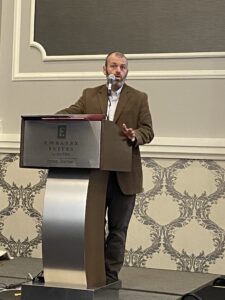
Kane Murdoch proudly billed himself as a contract cheating detective, something I’m proud to see in light of Bob Clarke’s role in this area (particularly as we once had a paper heavily criticised by reviewers for suggesting such a role should exist). Kane talked about the workflow he uses, with contract cheating processes following four stages: (1) suspicion, (2) investigation, (3) determination, (4) appeal.
Cath reminded us of the need to closely check references for evidence of contract cheating and provided some pointers. As a Computer Scientist, I do feel there’s lots of scope for automating the exploration of references and identify where things look amiss.
Ann Rogerson provided a related powerful tip, simply saying that we should get students to show us the process they used to find their sources. If a student can’t recreate this process, there’s a good suggestion that they didn’t complete the original searches for themselves.
Based on the numbers she’s collected in this field, Cath left us with this stark quote about where institutions should be at with contract cheating detection. “If your institution is not detecting contract cheating in 6% of the student population, you’re not succeeding”.
#2 – Exam Cheating Is Still A Problem
One of the big changes we’ve seen in the light of Covid-19 is a move to remote exams, often unsupervised, as a means of assessment. But if exams themselves are vulnerable to breaches of academic integrity, then surely ill-considered remote exams have many of the same issues as face-to-face exams and more?
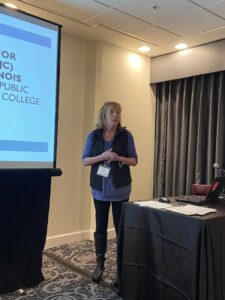
During the conference, Leonore Neary reminded us of some of the ways that students cheat. A long list of methods were presented included technical solutions like cell phone, smart watch, ear buds and camera use, but also more traditional methods like signalling, notes on clothing and notes concealed in pencil cases.
Leonore mentioned how unsuitable many room types are for taking tests and exams. Spacing and desk layouts often make them hard to invigilate and sometimes make it difficult for students to avoid seeing other student answers, even if they don’t plan to cheat. She shared her biggest success getting 85% approval from students by using privacy folders for multiple choice exams, essentially folders with small windows through which students can only view and answer one question at a time.
Leonore also shared a big tip for detecting cheating during the marking process, which is to look for evidence of eraser marks, often suggesting that answers had been changed when students were able to share their thoughts with one another.
#3 – What Students Share About You And Your Course Matters
One powerful reminder shared at the conference is that students have a lot of power to express their opinion about university life, teaching and research using the Internet.
Leonore Neary reminded us to “Google” ourselves and our class codes to see what they say. Students who have been put through an academic misconduct process or have a grudge often use sites like Rate My Professor to get even. Poor online feedback can be disastrous to the future careers of academics.
Students have also been observed encouraging their friends to gang up on by giving poor feedback to academics and were said to have even taken physical action, such as puncturing car tyres. University level support for people upholding academic integrity needs to be in place.
Ann Rogerson reminded us of the dangers of file sharing sites, said to be a bigger problem than contract cheating. Here, students share questions, answers, notes and resources online, often behind a paywall making them hard for academics to monitor. In many ways, this is an extension of the twenty-plus year old idea of an essay bank.
The file sharing site Course Hero was given particular attention in several talks. Eric Gibbs from Urkund said that this was now one of the most common sites found as a source of plagiarism in submitted student work.
I was inspired by the ongoing work of Kelly George to develop Course Villain, a web crawler for Course Hero. The work is still only in its early stages, so was presented in the form of a poster, but the software should enable academics to track when their work ends up on Course Hero, or when students are using this to share illicit materials. Kelly’s early work has again demonstrated just how big a problem this area really is.
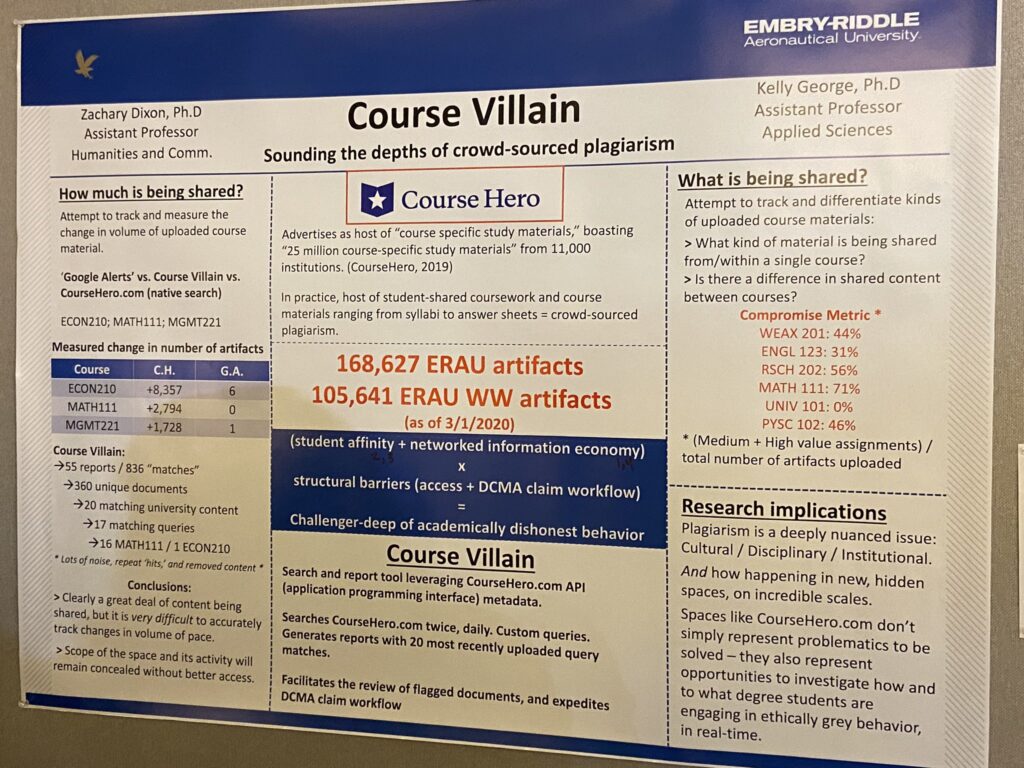
#4 – The International Dimension Of Academic Integrity Is Important
In my own presentation, I stressed the need for us to develop localised case studies and to realise that information on contract cheating needs to be considered based on an awareness of wider subject and institutional needs.
Several presenters reminded us that cultural awareness is important, with David Ison suggesting plagiarism is not universally seen as bad.
Stephen Gow has extensively researched how Chinese students adapt to studying in the UK, noting a disconnect between their expectations before arrival and the reality once they arrived. Motivated by the opportunity for independence, they often found a reality of language problems and limited opportunities for interaction with other students, areas we should we aware of when designing curriculum and scaffolding support into our courses.
Sarah Eaton has been continuing excellent work on contract cheating from a Canadian context. One striking observation Sarah shared is that contract cheating providers in Canada are marketing to students before they hit high school, but most teachers are still completely unaware of this. We need to be finding ways to get teachers to talk to their students about academic integrity from a young age.
International contract cheating firms are also finding news ways to appeal to students to get them to sign up their friends as customers. Mark Ricksen shared a fun example of an affiliate programme where students grow their virtual cactus with every customer they refer.
Mark also reminded us of the very real risk to students of blackmail and extortion by contract cheating companies. Having purchased a large number of custom essays for research work with Deakin University in Australia, Mark found essay mills that were requiring photographs of his credit card, leading to a real security risk of identity fraud. Mark didn’t share this personal information and avoided those firms, but worries that students may have felt compelled to proceed with the transaction.
I feel like I have to share the concluding findings of David Ison’s talk on international differences in academic misconduct here, just because it provided the quote of the conference. “When we cheat in the US, we cheat real good!”
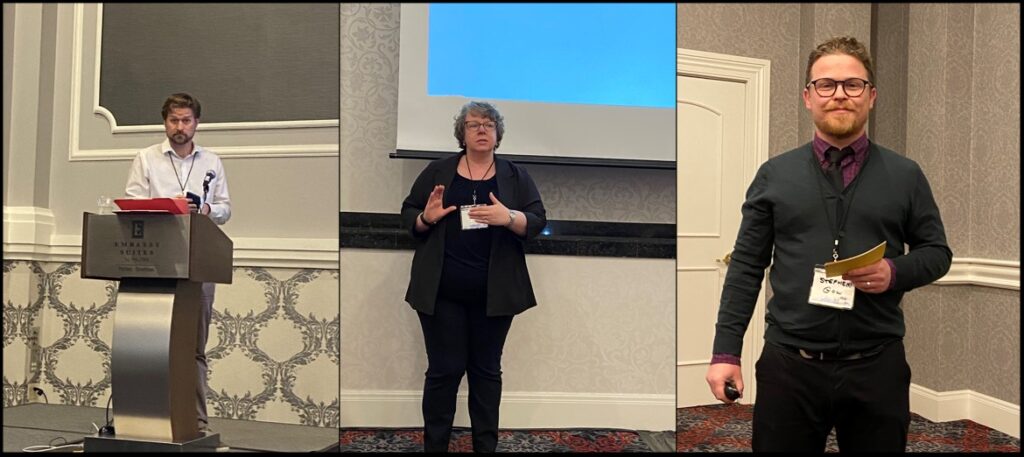
#5 – Graphic Plagiarism Is An Underexplored Issue
One of the most interesting talks at the conference came from a team at Ryerson University, exploring how students are cheating in graphic design and in how they create artwork. This matched nicely with my own talk, where I discussed the dangers of students in these areas being exploited by contract cheating providers.
As the Ryerson team mentioned, students have easy access to vast quantities of images and graphic design ideas through the power of Internet searches. There are currently major problems with students searching for designs, then plagiarising them or using them as inspiration with only minor changes to colours or layout.
Similar to how we might ask students to show drafts of written work, graphic design students can be asked to show their process. The Ryerson team also found evidence of students faking this process work, for example by getting friends to pose in ways similar to a final plagiarised illustration to look as if the friend was their inspiration rather than the image found online.
The team also provided a stark reminder of the dangers of sharing graphic work online, with one image they created ending up used without attribution on all manner of items from quilt covers to as a dating site logo. One Chinese company were said to have even claimed the copyright for that image.
In my own talk, I stressed that we need more research on academic integrity and contract cheating at discipline level. Art, for both its good practice and weaknesses, is definitely an area that should be at the forefront of that research movement.
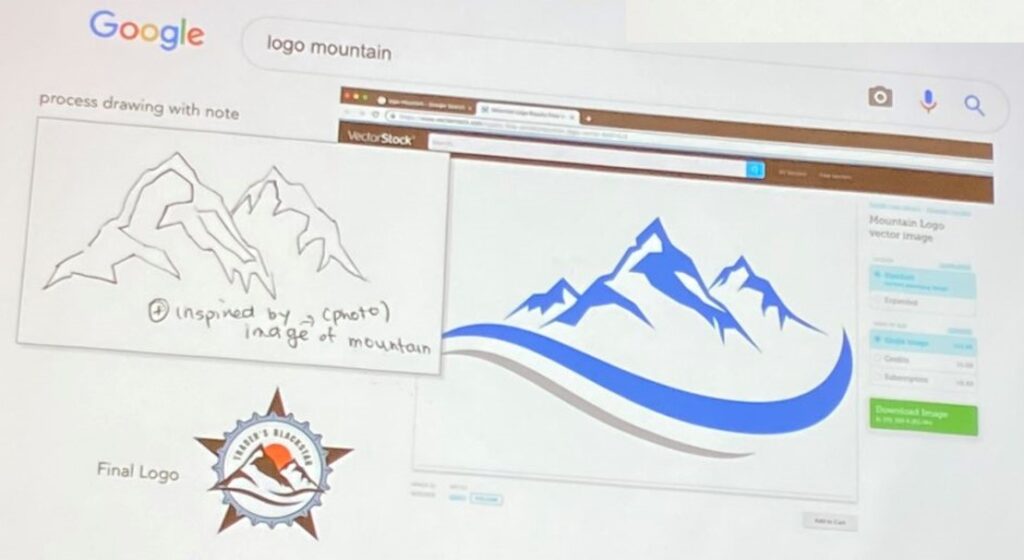
Next Year In Chicago
I fear we will learn a lot more about academic integrity in the coming months, including what happens when online assessment goes wrong.
Next year’s conference is planned for Chicago. Assuming the world is back to normal, I’m already looking forward to it.

Pingback: International Center For Academic Integrity Conference 2021 | Thomas Lancaster